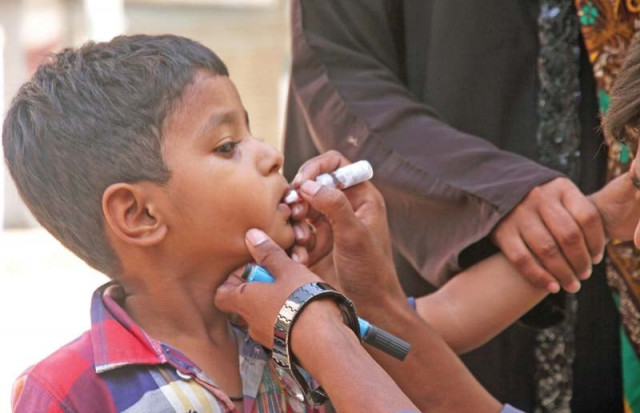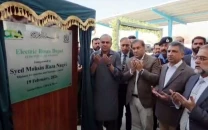Untrained vaccinators, poor monitoring among hurdles
Islamabad mayor calls for mobilising dedicated human resources; meeting discusses challenges in meeting polio targets

Another point raised in the meeting was that some high-end private schools refuse to allow their students to be vaccinated. PHOTO: ATHAR KHAN/EXPRESS
National Emergency Action Plan indicators say it is mandatory to achieve 95 per cent coverage in each polio campaign to meet the target, but the Islamabad Capital Territory (ICT) Administration has failed to meet the threshold in many of its drives.
At a meeting on Saturday to review anti-polio drives, analyse the polio campaign status in the federal capital, and to identify gaps and address core issues related to polio drives, it was noted that untrained vaccinators and area in-charges, lack of a monitoring system and refusals in some pockets were some of the factors, which were hampering government efforts.
Islamabad Mayor Sheikh Anser Aziz and Prime Minister’s Focal Person for Polio Eradication Senator Ayesha Raza Farooq chaired the meeting, which deliberated the challenges faced during the preparedness and conduct of polio campaigns in Islamabad and suggested solutions.
The meeting was briefed about the lack of staff for polio campaigns and the absence of a proper monitoring system. It was discussed that 50 per cent of teams lack female members and there was a dearth of accountable, full-time staff for the campaigns.
National Emergency Operations Centre National Coordinator Dr. Rana Muhammad Safdar quoted independent monitors while telling the meeting that the last few campaigns held in the federal capital recorded vaccination coverage at around 90 per cent, and the recent campaign held in early September recorded 89 per cent coverage.
“Given the target in the National Emergency Action Plan, the Islamabad polio team needs to put in extra effort to reach optimum performance levels,” he told the meeting.
Terming area in-charges and coordinators the backbone of the programme, he also stressed the need for proper training and selection of area in-charges and team members for achieving optimal results.
Senator Ayesha Farooq highlighted the sensitivity and vulnerability of the city due to multiple factors including continuous mobility of the population, its contiguity with Rawalpindi, and recent sub-optimal polio campaigns in the capital.
“It is high time to invoke a sense of urgency among officials of the capital to improve their performance,” she stressed underscoring the importance of vaccinators’ training and their better interpersonal communication skills to improve the interface with caregivers.
“Realistic workload on vaccinators and improved micro-planning is a key to reducing the number of missed children during polio campaigns,” she emphasised.
She stressed the need for paying more attention on the management, supervision, and accountability to tackle the gaps in anti-polio drives. She was optimistic that the country would soon overcome the challenges. She also called for focus on training of female workers to ensure the success of the drives. .”
She urged the local staff to meet the targets in the federal capital and reach every household for vaccination of every child. She also called for focus on improving the capacity of workforce and surveillance system to meet the needs of the polio eradication programme.
Sheikh Ansar Aziz said that a multi-task campaign would be launched in rural and urban areas from September 26 to December 30 for vaccination of children. “Every possible step would be taken to vaccinate every child in the federal capital and eradicate the virus,” he said while directing the Capital Development Authority’s human resource directorate to ensure that in all future campaigns, plans for deployment of dedicated staff would be shared with him.
Another point raised in the meeting was that some high-end private schools refuse to allow their students to be vaccinated. Aziz asked the officials to get help from the Private Educational Institutes Regulatory Authority in convincing the schools to allow their students to be vaccinated. Aziz said no lethargic attitude will be tolerated in the future.
The meeting was also attended by the Islamabad Police chief, and senior officials from the ICT Administration, CDA, and health ministry, along with representatives of development partners.
Published in The Express Tribune, September 17th, 2016.



















COMMENTS
Comments are moderated and generally will be posted if they are on-topic and not abusive.
For more information, please see our Comments FAQ